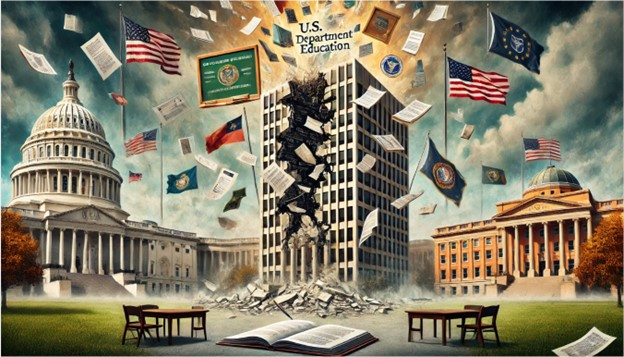Trump’s Education Revolution: Dismantling the Department and Rewriting the Rules
Input
Modified
A New Federalism: States Race to Reclaim Control An Ideological Reset: DEI, Gender, and the Federal Exit Plan The Quiet Collapse: Defunding Research and Losing Institutional Memory

A New Federalism: States Race to Reclaim Control
On March 20, 2025, President Donald J. Trump signed an executive order that would serve as a defining moment in the annals of American education. The order, which was succinctly but forcefully titled, instructed the Secretary of Education to commence the process of closing the U.S. Department of Education, transferring authority to the states, and terminating the federal government's long-standing influence on public education policy.
It was the culmination of a conservative ambition that had been in the works for decades, according to a significant number of observers. To others, it represented the commencement of an educational revolution.
The State of Iowa was the first to take action the day after the executive order was issued. The Iowa Department of Education submitted a formal request to the U.S. Department of Education on March 21, 2025, to request permission to consolidate ten diverse federal education funding streams—including $100 million in Title I funds for low-income students—into a single, flexible block grant. The objective of the initiative, which was spearheaded by Iowa Governor Kim Reynolds, was to grant the state greater control over the allocation of federal funds, thereby liberating it from the "dictates of distant federal bureaucrats."
Reynolds contended in an op-ed piece published in The Hill on March 22 that block grants would enable Iowa to "direct federal dollars toward local priorities" and "stretch federal dollars further." Her administration committed to maintaining the current civil rights protections and to continuing the use of assessments to monitor achievement disparities. However, critics cautioned that block grants could undermine accountability and erode equity for schools that serve disadvantaged students.
Oklahoma adopted the same policy on March 25, four days later. State Superintendent Ryan Walters submitted a comparable request, underscoring the state's intention to utilize federal funds to support private school options, including religious education, provided that those schools adhered to state accreditation standards. Walters foresaw a "marketplace of solutions" in which the educational environment would be determined by parental autonomy and religious liberty.
As per Jim Blew, a former Education Department official and co-leader of the Defense of Freedom Institute for Policy Studies, at least a dozen other GOP-led states, such as Florida, Ohio, and Kansas, were preparing comparable requests. In a March 18 op-ed, Governor Ron DeSantis of Florida had already endorsed the block grant approach, characterizing it as the logical next step in the dismantling of federal oversight.

An Ideological Reset: DEI, Gender, and the Federal Exit Plan
The order, which was more contentious, directed the Department of Education to prevent the use of federal funds for programs that promote "gender ideology" or "diversity, equity, and inclusion." Although this provision was expressed in legalese, it effectively mandated ideological alignment as a prerequisite for federal education funding. In a March 23 interview on CNN's State of the Union, Education Secretary Linda McMahon reiterated this stance, stating that funds allocated for low-income children and students with disabilities would be safeguarded, but that other programs would be evaluated for compliance with the new directive.
Legal experts were quick to point out that the closure of a Cabinet-level agency necessitates an act of Congress, despite the order's comprehensive language. The order was deemed "extremely dangerous" and likely unlawful by Representative Bobby Scott (D-VA), the ranking member of the House Committee on Education and the Workforce. He stated to the Associated Press, "It will render it nearly impossible to hold states accountable for providing a high-quality education to all students."
Nevertheless, the Trump administration implemented administrative measures to diminish the department's size, including the cessation of new grants, the suspension of hiring, and the promotion of state-led innovation through waiver requests under the Every Student Succeeds Act (ESSA). In spite of the fact that these actions were technically within the Department's jurisdiction, civil rights organizations and educators expressed concern regarding the potential for increasing disparities.

The Quiet Collapse: Defunding Research and Losing Institutional Memory
Another, less visible conflict was unfolding within the educational research community, while the political headlines focused on structural changes and funding fights. On March 24, Education Week published a scorching opinion article by Stephen H. Davis, a professor emeritus at Cal Poly Pomona, in which he lamented the Trump administration's subtle yet effective elimination of federal funding for education research.
Davis described the transformation of K–12 education over the past 45 years as a result of federal research funding, particularly through the Institute of Education Sciences (IES) and the Education Innovation and Research program. He emphasized a $1.5 million grant that was granted to Cal Poly Pomona, which facilitated the establishment of a state-of-the-art administrator training program that was based on apprenticeships. The program would subsequently serve as a national paradigm for leadership preparation and influence statewide licensure policies.
However, such success tales may soon become vestiges of the past. Contracts have been terminated, discretionary grant programs have been suspended, and new research initiatives have been effectively halted by the Trump administration. The total amount saved is negligible—only $284 million last year, a mere fraction of the federal budget—but Davis cautioned that the long-term cost to American education could be astronomical.
He wrote, "We are forfeiting our educational knowledge capital stock." Policymakers and educators are compelled to rely on anecdotes and ideology rather than proved practices in the absence of empirical evidence.
Ultimately, the education debate of 2025 is not solely a policy debate. It is a conflict that pertains to the fundamental principles of public responsibility, equity, and learning. The question of who will represent the students who are most at risk of being left behind remains as states race to fill the void left by a retreating federal government.





















